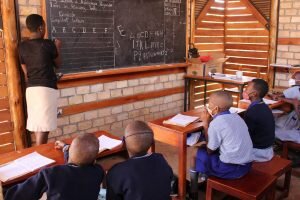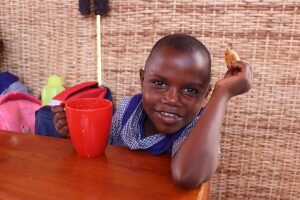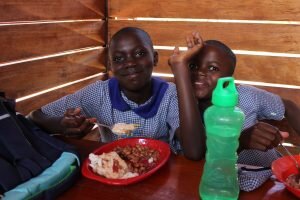By Deontae Griggs | Digital Marketing Manager
The World Bank defines school feeding programs as a targeted social safety net that provides educational and health benefits to vulnerable children, aiming to increase enrollment rates, decrease absenteeism, and improve nutrition at the household level.
Globally, school feeding programs are one of the most significant and widespread social safety nets, benefitting 388 million children. One in every two schoolchildren worldwide receives a school meal, although there are wide disparities between countries. The expansion and institutionalization of these programs are most prominent in low-income countries, where such efforts can substantially impact children’s welfare.
A 2013 report by the World Food Program (WFP) highlighted that school feeding programs were disproportionally distributed, not covering the regions that needed them the most. It was the same case in 2020, but the gap has begun to close thanks to the efforts of grassroots organizations. Between 2013 and 2020, the Global South made crucial steps forward in proposing policies and funding for school feeding programs.
School Feeding Programs have several benefits:
When Ashinaga launched the Terakoya program in 2007, it ensured free food and water for all students in addition to educational support. This provision has been fundamental, proven by the baseline analysis, which showed that 35% of the students in the program scored underweight on the Rohrer Index – a mass-height ratio. Terakoya places emphasis on creating a school experience that helps them in their academic growth and ensures regular nutrition. For some of these kids, school is what guarantees them at least one meal a day. For this reason, Ashinaga has invested resources to ensure that programs like Terakoya’s can help as many children as possible.
Covid-19 has made it harder for children in the Global South to attend school. These complications have compromised their ability to access proper nutrition, primarily due to the financial impact that the pandemic has had on households’ income. School feeding programs such as the one offered at Ashinaga Rainbow House are vital in ensuring adequate education and food for children.
Access to Education for Talented African Students
By Ashinaga USA Scholar, Godfrella Jonat-George
About 12 weeks ago, I was sitting at the dinner table eating and conversing with a friend about my study abroad semester in Stockholm, Sweden. Naturally, I was very excited about the prospect of living and studying in Sweden for four months. At the same time, I had zero expectations about what my life would be like in Sweden. What I had was an open mind, and I was very open to learning and living the Swedish lifestyle. To do that, I opted to live with a Swedish host family and take a Swedish language and culture class.
My time in Sweden so far has been fabulous. My host family is amazing, and I feel like I am a part of the family. Even the family pet labradoodle now barks in English and Swedish because of me. I have had the world-famous kottbullar and potatis (Swedish meatballs and mashed potatoes) and semla (a Swedish pastry bun filled with almond paste and whipped cream). And I have adopted the typical Swedish escalator etiquette of standing to the right and walking to the left. I am also a student blogger for my study-abroad institution, a job that drives me to observe and reflect on life in Sweden (and, of course, promote the program). I have been learning the Swedish language in my Swedish class. Even though I struggle to understand everything, I can successfully use context to eavesdrop on conversations in the metro during my commute to and from school. Today, I was finally able to read an advertisement in the metro station. This is an outstanding achievement considering that my assignment for Swedish class this week is to see how much Swedish I can understand in my environment.
I have found that Sweden emphasizes having a work-life balance, which is reflected in my schooling as well. My learning must be translated to the real world, so my courses have experiences like field studies and study tours. In some of my field studies, I have visited museums such as The Nobel Prize Museum, toured the royal palace, and conducted a short survey on people’s perceptions of the stock market. My Forensic Psychology class visited Scotland this past week. We saw and spoke with organizations that work with criminal offenders and provide victim services to understand how they practice the concepts we learned in class. These visits greatly informed my exploration of reentry initiatives in Sierra Leone for formerly incarcerated people, which is the focus of my Ashinaga Proposal.
The best thing about visiting Scotland was being able to reconnect with some of my Ashinaga family. I lack the words to describe the joy I felt when I laid eyes on them after three years. From studying abroad and beyond, I am grateful that I get to experience life in a different culture and associate with people. Each new experience makes me learn more about myself and appreciate all that life offers.
Godfrella is an Ashinaga Africa Initiative Scholar from Sierra Leone, studying Psychology in the US. Her kokorozashi, which roughly translates to purpose in life,is to change the mental health landscape of her home country. Godfrella is expanding the international scope of her studies by spending a semester abroad in Sweden. She was selected from other University of Richmond students to chronicle her studies abroad; you can read more about her experience here: https://athomeabroadschool.wordpress.com/blog/
By Shona Lynch Morimoto | Project Leader
By Shona Morimoto | Project Leader
Project reports on GlobalGiving are posted directly to globalgiving.org by Project Leaders as they are completed, generally every 3-4 months. To protect the integrity of these documents, GlobalGiving does not alter them; therefore you may find some language or formatting issues.
If you donate to this project or have donated to this project, you can receive an email when this project posts a report. You can also subscribe for reports without donating.
Support this important cause by creating a personalized fundraising page.
Start a Fundraiser

